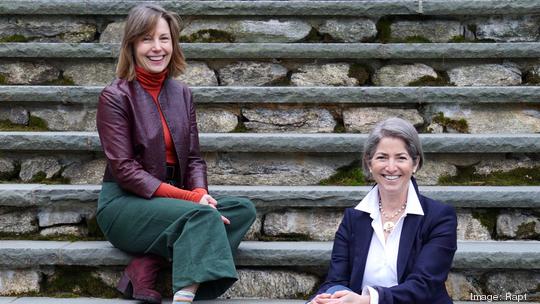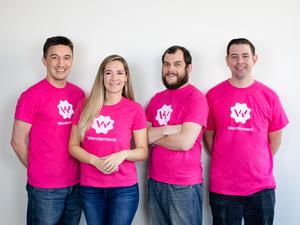
Innovation, eco-consciousness and resilience are at the heart of Rapt: a Boston-based reusable fabric company looking to replace the use of traditional wrapping paper.
Rapt grew from its founders' collective realization about how much waste is created by wrapping paper at the end of events and holidays.
Founders Monica O’Neil and Cindy Estes have seven children between them, and the two-woman team says the company is striving to create a better world for everyone’s children to grow into. The duo are working intentionally to obtain eco-conscious life habits can make a substantial difference.
Rapt is 100% self-funded, and O’Neil and Estes say they will be working to seek external investments in the near future. O'Neil handles the financial and operations of the business, while Estes uses her fashion-design experience to handle the creative side of the business.
Rapt had found success at pop-up shops during pre-pandemic days, where the founders were able to work hands-on with potential customers and show them the different ways that Rapt can be used for gifts.
“So many people feel they are not crafty enough to use Rapt, until they try it out and realize it’s actually easier than doing the old-fashioned style of cutting up wrapping paper and fumbling around with tape” Estes said.
Rapt finds so-called "deadstock" — reclaimed and remnant fabrics, yarns and ribbons — whenever possible. In sourcing its fabrics for the Rapt sheets, the duo is focused on obtaining and cutting fabric from local sources.
“We’re really conscious in using low-waste packaging and putting scrap fabrics to use by upcycling them into gift wrapping accents,” O'Neil said.
Rapt says it's paving the way for reusable, self-sustaining, and eco-friendly gift wrap in the U.S., by introducing the U.S. market to Rapt’s base in the art of Furoshiki. The custom of wrapping with cloth dates as far back as the 7th century and was originally called "Tsutsumi."
The duo say they face little to no competitors outside of stand-alone brands and individuals selling the concept via Etsy.
What differentiates them from individuals selling reusable wrapping fabric online is the attention to detail. Rapt does not only sell fabric but accents such as bows, ribbons and gift tags.
They aim to make an heirloom gift wrap sheet you can pass on to family and friends. Unlike competitors, Rapt is made to be timeless. O’Neil and Estes plan to steer away from holiday based prints and instead use simple patterns with accents that honor seasonal colors.
The uniqueness that Rapt offers is that the fabric can be tied in a plethora of ways, eliminating the need for scissors or tape. Rapt also functions with or without the use of a box to wrap. Each Rapt purchase comes with instructions and styling suggestions on the best ways to get gifts wrapped. The options for tying up gifts, large and small, seem endless.
At their lowest price point, Rapt ensembles sell for $28 and come with three square Rapt sheets (11.5 inches for small, 19 inches for medium and 27 inches for large) and include: two yards of luxe ribbon, the Rapt accents (floral flourishes/poms), three Rapt gift tags. At their highest price point, Rapt sell for $180 for family-starter packs, packaged in a cloth basket and includes more sheets along with spools of luxe ribbon and more.








